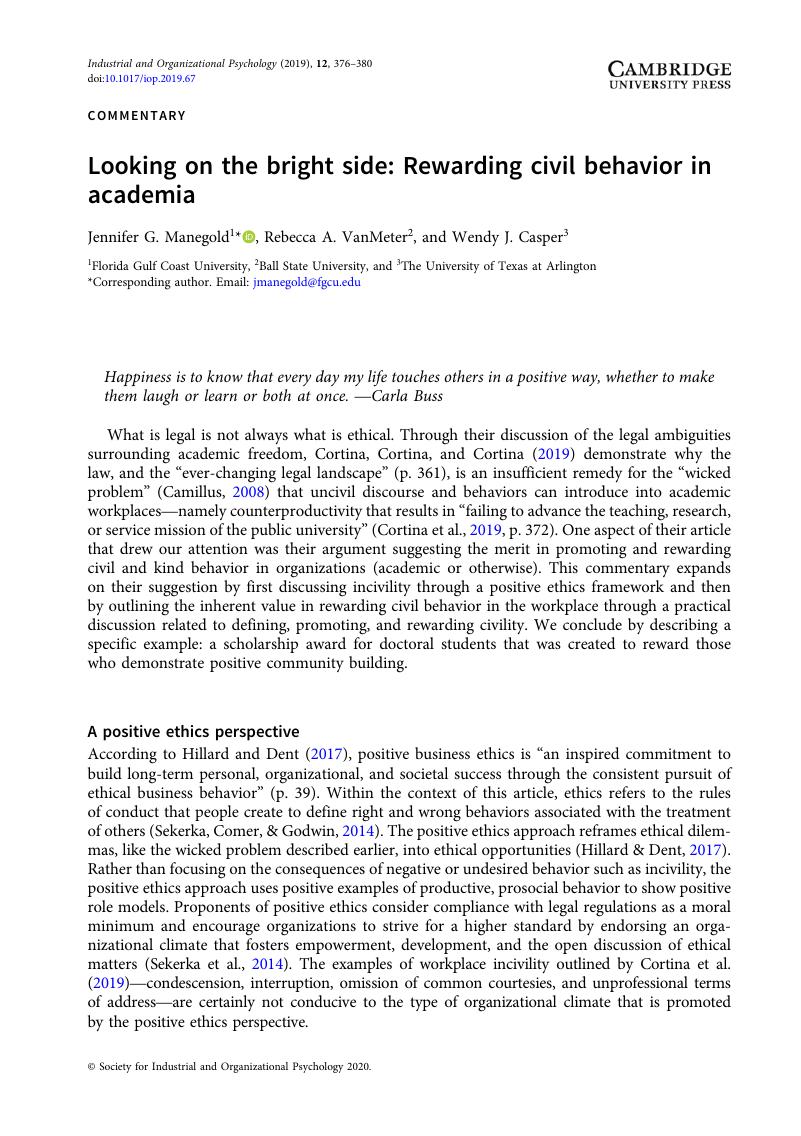No CrossRef data available.
Article contents
Looking on the bright side: Rewarding civil behavior in academia
Published online by Cambridge University Press: 14 January 2020
Abstract
An abstract is not available for this content so a preview has been provided. Please use the Get access link above for information on how to access this content.

- Type
- Commentaries
- Information
- Copyright
- © Society for Industrial and Organizational Psychology 2020
References
Camillus, J. C. (2008). Strategy as a wicked problem. Harvard Business Review, 86(5), 98.Google Scholar
Caruth, G. D. (2015). Doctoral student attrition: A problem for higher education. Journal of Educational Thought/Revue de la Pensée Educative, 48(3), 189–215.Google Scholar
Clark, C. M., & Kenski, D. (2017). Promoting civility in the OR: An ethical imperative. AORN Journal, 105(1), 60–66.CrossRefGoogle ScholarPubMed
Clark, C. M., Olender, L., Kenski, D., & Cardoni, C. (2013). Exploring and addressing faculty-to-faculty incivility: A national perspective and literature review. Journal of Nursing Education, 52(4), 211–218.CrossRefGoogle ScholarPubMed
Cortina, L. M., Cortina, M. G., & Cortina, J. M. (2019). Regulating rude: Tensions between free speech and civility in academic employment. Industrial and Organizational Psychology: Perspectives on Science and Practice, 12(4), 357–375.Google Scholar
Hillard, J., & Dent, E. B. (2017). A positive approach answering business ethics educational ineffectiveness. Journal of Applied Management and Entrepreneurship, 22(2), 39–66.CrossRefGoogle Scholar
Kong, X., Chakraverty, D., Jeffe, D. B., Andriole, D. A., Wathington, H. D., & Tai, R. H. (2013). How do interaction experiences influence doctoral students’ academic pursuits in biomedical research? Bulletin of Science, Technology & Society, 33(3–4), 76–84.CrossRefGoogle ScholarPubMed
LaVan, H., & Martin, W. M. (2008). Bullying in the US workplace: Normative and process-oriented ethical approaches. Journal of Business Ethics, 83(2), 147–165.CrossRefGoogle Scholar
Onwuegbuzie, A. J., Rosli, R., Ingram, J. M., & Frels, R. K. (2014). A critical dialectical pluralistic examination of the lived experience of select women doctoral students. Qualitative Report, 19(3), 1–35.Google Scholar
Sekerka, L. E., Comer, D. R., & Godwin, L. N. (2014). Positive organizational ethics: Cultivating and sustaining moral performance. Journal of Business Ethics, 119(4), 435–444.CrossRefGoogle Scholar


